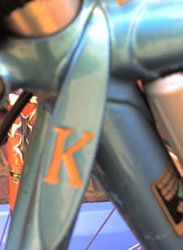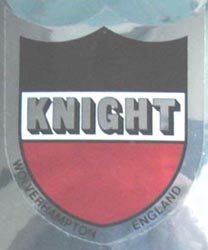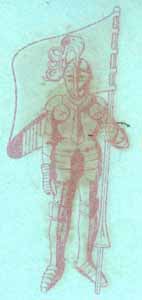Knight Cycles
Posted: Saturday 06th June 2020
This history of this small firm is as recollected by Michael (Mick) Hessen in conversations with Alvin Smith with some additional information from Paul Arnold and Tim Harris. If other readers can help, either to firm up dates, or if they remember other things, please get in touch with the writer through the webmaster. Hessen says the firm has been in existence, originally trading as Knight Fabricators, since the early 1970’s, possibly about 1973. This is partially confirmed by Paul Arnold, who was just starting work at about that time somewhere around 1975, and remembers that he had seen Knight frames in his club when he joined it as a school rider in 1973.
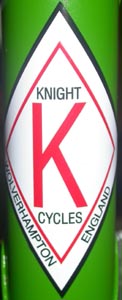
Whenever the firm started, the first generation of cycle frames, well before the Hessen era, was made at Pendeford Airport just outside Wolverhampton. The frames were built by two men who had both been trained through working at Viking Cycles. Viking had been a major highly successful lightweight bicycle company in Wolverhampton, having been founded in 1908 in Heath Town then moving in the 1920’s into Broad Street.¹ This well known firm, after a major resurgence in the 1950’s which was largely due to the re-invigorating of cycling by BLRC with the introduction of road racing, later succumbed to competition from the motor car and finally closed down in 1967² after running into financial difficulties.
By the late 1960’s or early 1970’s cycling was recovering from its 1960’s slump and Hessen believes that it was then that the two ex-Viking men, Jim Gittins and Les Holland, got together with the aim of making high end clubman’s frames. Paul Arnold remembers that at this time in his cycle racing club Knight frames were popular and well thought of so it appears the two original frame builders were doing it right!
Meanwhile Hessen had been ploughing his own furrow. He had trained as an electrical engineer but had also become a keen club cyclist. Hessen was in fact good enough to progress from a local club to Manchester Wheelers where he was riding with first class riders such as Pete Matthews and from which he would be selected for rides in the Milk Race and Tour of Britain. By the mid 1960’s cycling had won the battle for Hessen’s time and he took over Hales Cycles of Tipton which he ran for some 10 years until 1976. He remembers he had to get his parents to run the shop for him whilst he was away being a competition cyclist.
Then in 1975/6 re-development in Tipton saw his shop being compulsorily purchased and a new venture was needed. It was at this time then that Frank Clements, one of the well known cycling Clements family, was on hand to suggest that a good commercial opportunity lay in first class wheel building and he, together with Hessen and their friend Barry Moore, duly set up a new enterprise near to the present premises. Frank was to be the sales manager and had import agency contacts with several trade companies such as Pellissier – it was important in those days to have the personal contacts for trading. Frank Clement did not however stay long with the firm and soon it was down to Hessen and Moore.
Hessen and Moore’s own staff of wheel builders were mostly drawn from yet another major Wolverhampton firm, the Wearwell Cycle Company, which had been created in 1909 by the Clark family and which having been a major local employer and an exporter of cycles had closed its doors in Wolverhampton in 1972 when the original company moved its premises to Alveley near Bridgnorth. Many workers were not prepared in those days to follow the old firm such a distance and were looking for new local employers.
By the 1980’s Hessen’s wheel building company was busy supplying wheels to local Wolverhampton shops and in fact beyond. Hessen recalls making wheels for Saracen (see later) and later again for Marin Cycles, then setting up as importers to Great Britain. It was in the early 1980’s that Mick and his partner were brought together with the two partners who owned the Knight Fabricators business by yet another cycling name – Bobby Thom, who was also ex Viking Cycles. It was Thom who saw the commercial opportunity of their joining together and being able to offer complete bicycles
Hessen and Moore and Knight Fabricators duly merged and became Knight Cycles in the early 1980’s and both sets of staff set up in the old Hessen and Moore premises under the control of four partners, two from each original enterprise. Hessen recalls that the story was that the name Knight had been inspired by a small statuette of a medieval knight in armour as a fire tongs set owned by one of the frame builders. Mick notes that bicycles were mostly sold through normal trade outlets, typically the small cycle dealers such as Stan Jones Cycles of Shrewsbury, Staples at Warwick, or Brothertons at Old Hill, and of course there were then quite a few similar shops around. Tom Jones of Stan Jones Cycles recalls that it was around the mid 1980’s. The frames all had K as a prefix or suffix and were supplied in a number of differing specifications for the off-the-shelf market.
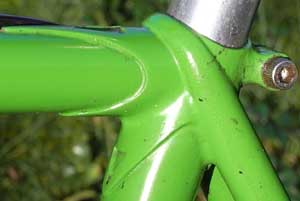
Tom thinks the numbers were small, perhaps a couple of batches of 5 or 6 frames. At the same time individuals who approached the firm wanting to buy direct were accommodated and whatever they needed to complete the bicycle was bought in through the trade for them. This custom trade was not a major activity for the firm. Some of the shop outlets had a good throughput at this time and some came to Knights with their own specification. A number of these shops also employed several bike assemblers working just with Knight frames at their shop. Knights worked up to about 14 men on the pay roll at the firm’s peak. The firm retained its connections with the sport and together with Whitemans the Manchester wholesaler and Gibbsport the clothing manufacturer the firm supported the Whitemans/Gibbsport/Knight Racing Team.
This was probably the mid 1980’s, which Mick remembers as being their best years when seven to eight frames per week would have been the maximum throughput. Mick has noted that the frame number would have been stamped on the bottom bracket with the fork steerer tube usually only carrying the last digit of a small batch. This was done so that when the framesets were being painted, which was also done in-house, the forks (painted separately from the frames) could readily be put into their correct frame at the final building stages of production.
A number of makes and models of lugs were used – though mostly Prugnat with bottom bracket and drop outs from Haden or other British firms, all sets being sourced from local trade suppliers. There have been a number of types of Knight transfers, the original pattern being solvent fix type similar to those shown below (down tube) and at the top of the page, which are in fact modern reproduction facsimiles on thin vinyl by H Lloyd Cycles.
In its hey days the firm produced a number of models, all with names which could be associated with the name Knight in some way, such as the Knight Commander. One of these was the Knight Saracen model. This model was in fact to a specification supplied only to Staples. This firmâ´ developed from Brian Staples’s cycle shop in Kenilworth, Warwickshire. Elaine Dunn, Brian’s daughter recalls how her engineer father had a keen interest in building his own bicycles. Early in the 1980’s he arranged for Knight Fabricators to provide frames to his own specification which were built up into complete bicycles by Jim Gittins in the back of Staples’s shop. Jim, who was initially on loan from Knights, eventually, as demand grew, left Knights and worked direct for Staples. Staples began to take larger numbers and the Saracen model name indirectly gave rise to something bigger.
Staples moved his business to Turriff Industrial Estate, Warwick where he was also helped by his wife Gillian and Elaine. Elaine, who joined her father’s firm on leaving school, recalls “ I remember both Jim and Les and visiting them when we used to buy frames from them. Of course that was the start of our business and at that time it was based on racing bikes and tourers. It only progressed to mountain bikes when we moved to Warwick. The first mountain bike with a Saracen name on it was actually a stripped down and repainted bike from Japan.
We saw the bike come into one of the suppliers and thought it looked a good idea so I repainted it, put our own name on, photographed and sold from that photo until we had all the parts needed to build our own.” Staples retained Gittins who stayed with this firm even when Staples was bought out by the Bluemels companyâµ. At one time Saracens were also taking all their wheels from Knights but as volume production increased Knights lost out to bigger wheel building companies who depended on machinery for building and high volume/low cost out-competed the hand built wheels of Knights.
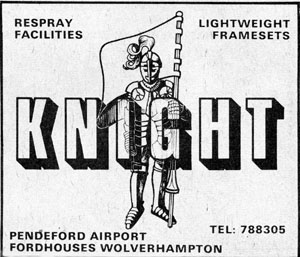
The firm always retained wheel building as a major commercial activity alongside making whole bicycles or just frames. In the mid 1980’s Barry Moore had decided to retire, and when Jim Gittins moved to Staples only Hessen and Les Holland remained of the original management team. Life was becoming hectic with many of the ex Wearwell operatives also retiring in the 1980’s. Then Les Holland died suddenly in the late 1980’s and the firm was struggling. Jim Gittins was attracted back from retirement at Knights as a frame builder to keep them going, and Jim was assisted and, when he finally retired replaced, by another younger man who was able to build and spray, but it was not long before he too was enticed away. In fact the firm ceased to make bicycle frames in the early 1990’s, when a combination of staffing problems and cheap frames from Taiwan and then China made frames that were handmade in UK unattractive in price. At this period there were additional pressures as cycle frames of aluminium and even carbon were beginning to be sought after by cycle aficionados. These young men would previously have been willing to buy handmade and more expensive steel frames but this habit was changing as steel was seen as having lost its technical edge for competition frames.
Knight Cycles now operates by wheel building only and has in fact specialised further into making only small bicycle wheels, the market for lightweight cycle wheels being largely satisfied with proprietary mass produced wheels from the manufacturers of group sets such Shimano, Campagnolo and Mavic. Mick Hessen remembers his life in the bicycle trade as one long battle to survive – though there was some fun along the way! Now at retirement age plus he and his daughter clearly enjoy their day to day involvement with the trade, but still find life hectic. Hesssen remembers how it has been hand to mouth for most of the time and comments that for many years they were making money alright but did he ever get to see it? In the days of Hales Cycles Mick recalls with disbelief that the big thrill of a week was if he could sell just one Raleigh Roadster – then worth about £25. Such bicycles were the staple for the local bike trade at the time as they were used to take everyone to work and back.
1 – Notes on Vikings by Richard Coles
2 – Notes on the bicycle industry of Wolverhampton, 2005 Wolverhampton City Council.
3 – Wolverhampton Cycles and Cycling, by Jim Boulton, Brian Publications, 1988
4 – Information provided by Elaine Dunn, nee Staples, October 2010
5 – Jim Gittins though had left the Saracen sometime before Blumels had to sell. Up to this time frames had remained handbuilt, but this changed when the firm was bought and put on a fully production line basis by the Stanforth brothers, Richard and Paul.
The following additional information was received from Elaine Dunn (Staples) on 6 October 2010 – Alvin has modified the page to take account of this:
“In the article on Knight Cycles above there are references to Staples of Warwick. I would like to add some information for you about this.
You are actually referring to Brian Staples who ran a cycle shop in Kenilworth, Warwickshire. Brian was by trade an engineer, and had an interest in building his own cycles. Knight fabrications did supply frames to him which were built into racing bikes out the back of his shop and marketed under his own name. As the business grew, he decided to move to manufacturing premises of his own to ensure consistency in the product.
He duly moved his business to Turriff Industrial Estate Warwick where he was helped by his wife Gillian and daughter Elaine. He did use the name of the Knight Saracen frame to brand his own products which became Saracen Cycles. The first UK ATB was sold from these premises and subsequently Saracen led the way in the production of this new trend. They themselves then became market leaders and supplied frames and complete bikes to some of the major names in the UK cycle industry.
With the purchase of Saracen by Bluemels, the factory was moved to their site in Coventry. Jim Gittins never worked for Saracen under the ownership of the Stanforth Brothers, only that of Bluemels and Brian Staples. Jim had left Saracen by mutual consent by the time that Stanforths had purchased the Company from the Official Receiver when Bluemels went into liquidation. :
Posted: Saturday 06th June 2020
This article appears in the following categories.
Upcoming Events
Whether you are looking for a gentle social meet up, or a 100-mile ride browse the community’s upcoming events and plan your next weekend outing.


